- Home
- James David Victor
Invasion- Pluto Page 3
Invasion- Pluto Read online
Page 3
“And you think that this Taranis Industries might be just as bad as NeuroTech? That they might have more of the dormant cyborgs?” Solomon asked.
“They could have.” Asquew nodded. “But there could also be clues as to what the contents of the Ru’at’s original message was. If we understood their technology as well as NeuroTech did, then we might have better chance of defeating them.”
“But, sir… Why me? Can’t you just authorize Earth-local security services?” Solomon asked.
“This is a matter of trust, Solomon,” Asquew said. “You’ve fought the cyborgs. You know what they are capable of. And besides which, we know that NeuroTech or Taranis could not have been acting alone. They managed to supply the Chosen of Mars with Marine Corps equipment, which means some sort of Confederate involvement. We need to find out just how deep and how dangerous this conspiracy is.”
“You think that there might be other traitors on Earth?” Solomon asked. “Those loyal to Mars?”
“Those loyal to money, Lieutenant. Someone with access to Marine Corps equipment attempted to start the war by attacking Titan,” she said. “That points at collusion between some of the mega-corporations and a conspiracy inside the Confederacy itself!”
Solomon remembered. He had been there, attempting to save the ambassador’s life.
“How many traitors are there? Are they merely Martian sympathizers or are they in fact in league with the Ru’at?” The general grimaced. “Believe me, Lieutenant, these are questions and considerations that I would much rather not be having to think about. I would rather be out there, sword in hand and a gun at my hip, fighting the Ru’at beside my fellow Marines.”
From the look on her face, Solomon believed her.
“But this is the nature of high office, Lieutenant Cready,” Asquew said dryly. “We discover that our enemies aren’t just the ones that we fight out on the field of battle, or in the spaces between the stars. Sometimes we find them wearing suits and occupying ever higher and rarefied positions.” Her expression turned sour, and then she sighed.
“It helps that you seem to have made a habit out of not-dying, Lieutenant Cready,” she said as she turned back to look at the disappearing dot of the Oregon.
“Sometimes I think that it’s more of a lifestyle than a habit, ma’am,” Solomon said as he also watched the Oregon start to lock into flight with its jump-ship. Any minute now and he might never see his friends ever again. They would be taken over spacetime by the Barr-Hawking jump-ship to Pluto…and then what?
Was there anything that a mere hundred Marines could do to stop a force like the Ru’at?
“Sir… Is it still possible to get a message to the Oregon?” Solomon frowned.
“Of course,” the general said. “As soon as she jumps, it’ll be the same old long-distance radio transmissions that we all have to put up with.”
Solomon nodded. It was one of the greatest threats to the Confederacy—and to humanity as a whole—that they hadn’t discovered some sort of faster-than-light form of communication.
“I just want to get a message to Sergeant Jezebel Wen. Please tell her to look after the squad for me while I’m gone.”
4
The Future of Earth
Does she know about my real mission? Solomon wondered as he looked over at Ambassador Ochrie, sitting across from him on the shuttle. She sat in perfect, determined repose as she always did, an older woman with hair long since given over to silver-white, and with deep purple and red robes. Beside her sat her Scandinavian personal assistant—a tall, thin blonde in matching robes, whom Solomon had seen fire a pistol like a sharpshooter.
“I don’t know why the general cannot agree to scheduling a personal jump-ship,” muttered Imprimatur Mariad Rhossily on the opposing bank of chairs, leaning forward and picking at her nails in frustration.
Solomon could see where the woman was coming from, at least. The shuttle that they had left the Indomitable in was of the utmost luxury and quality, a small, box-like shape on thrusters and positional rockets, whose interior was plush and decadent. Several lounge chairs with comfortable upholstery sat next to large portholes displaying views of the Martian surface.
The ruined Martian surface, Solomon had to correct, at least to himself.
“Because that would attract too much attention, Imprimatur,” the ambassador said evenly. “The Confederacy may indeed by wealthy, but we’re not so rich as to use an entire jump-ship on one tiny shuttle!” Ochrie laughed.
Which is a fine excuse, Solomon thought. What was the real reason? That the general didn’t want to alert Taranis that they were coming for them? That she didn’t want to spook the citizens, or alert the traitors inside the Confederacy?
Well, if worrying people was her main concern, she’s failed in that job! Solomon could have sniggered, given the thermonuclear devices and imminent troop dispersals to Mars.
Whatever the reason, however, the shuttle they were on swam through space towards the designated holding zone, where a much larger transport was currently allowing similar such shuttles to dock and attach at its belly like calves to a cow. Out to one side, Solomon could see the stationary Barr-Hawking jump-ship, waiting for them to dock and join all the others.
“Activating docking procedure in three…two…and—”
Clunk! Solomon shook a little where he stood beside the two seated women as their small craft connected with the larger ship and attachment arms slid into place over their wings.
“Jump procedure beginning. Prepare to brace in five…four…”
“It won’t take long, Imprimatur,” Ambassador Ochrie said soothingly. Solomon realized that Mariad Rhossily, growing up on Proxima, must have the belief that jumps took hours, almost days, to get from one useful destination to the next. Here around the near planets, however, it would only take a matter of minutes to get to Earth orbit.
Solomon’s ears popped and he felt a sudden and bewildering vertigo as the jump-ship started to work, throwing out magnet-lock cables to attach to their own parent transport’s hull, and for their craft to be pulled along for the ride, like fleas on the back of a dog.
They jumped.
“Leaving jump… All passengers, brace.”
The automated words of the shuttle computer blared into the room where Solomon was swaying on his feet, fighting off jump-sickness.
One thing’s for sure, faster-than-light travel has got to be smoother than this! Solomon considered.
“Decoupling from jump-ship. Welcome to Near-Earth Space.”
Solomon felt vibrational shudders running through the shuttle floor as the distant magnet clamps were released from their parent craft and they decelerated to enter the space between Earth and the Moon.
“First time to Earth, Imprimatur Rhossily?” the ambassador asked, uncoupling her belt to gesture to the porthole for her opposite number to take a look. Over their shoulders, Solomon could see the bright orb of the Earth, its upper atmosphere a sea of grays and whites. On the other dark side of the planet, they could see the vast neon spiderweb of lit-up mega-cities.
I wonder if I can see New Kowloon from here. Solomon peered a little closer.
“Shuttle Xge-4, you are ready for detach,” the speaker system said, followed by a further series of shakes as their transporter released the lichen-like shuttles that clung to its belly, falling away like metal leaves. Solomon felt his stomach lurch, and then the shuttle fired its own rockets, headed for the New York Space Elevator, clearly visible as it poked up from the dome of their mother planet as a string spiderweb lines leading to a platform-station shaped like a snowflake.
There were only three space elevators in existence on Earth, at New York, Shanghai, and Mexico City, but they had been humanity’s key achievement in getting to the stars. It cost far less energy to attach shuttles to the cables and send them up to the platforms without having to deal with escape velocity. After that, the Confederacy’s conquest of the near planets was all but written in the stars.
<
br /> “It doesn’t look like Proxima,” Imprimatur Rhossily said doubtfully. “It’s too…busy.” She sounded surprised, although Solomon figured she must have known what Earth was like.
She’s right though, Solomon thought. Earth had made a mess of its planet, and its near-orbit was filled with satellites and stations moving in complicated geometric patterns around each other. The parts of the planet that were visible in the breaks of heavy gray clouds were mostly filled with cities or barren industrial zones. Proxima, on the other hand, still looked like an untouched wilderness.
But Earth’s mine, Solomon thought affectionately anyway. She might be dirty and hectic, but she was the soil that he had grown up on. Somewhere, far below him, he knew that he could find streets that he remembered, and noodle bars where the owners would know just what his favorite dish was. There might even be people who remembered his name…
But not friends, though. Solomon’s thoughts soured as they drew nearer and nearer to the space elevator, its navigational beacons flaring red and green.
No, Solomon didn’t have any friends left on Earth, if he’d ever had any to start with. His childhood in the Midwest of the American Confederacy had been a fraught time of which he could remember little except getting into trouble, and his second life in New Kowloon had seen him cause the death of his only friend, Matty Sozer.
Maybe it’s for the best if no one remembers my name on Earth, Solomon was starting to think, just as a rising bubble of white light engulfed the New York Space Elevator.
5
Attack!
“WAO! WAO! WAO!”
Alarms were going off throughout the shuttle that Solomon, Ambassador Ochrie for Earth, and the Imprimatur of Proxima, Mariad Rhossily, were in as they watched in horror at the scene playing out below them.
“Someone’s blown up the space elevator—” the ambassador was whispering, her face ashen.
“Ambassador! Someone’s blown up New York!” Imprimatur Rhossily pointed.
Holy frack, she’s right, Solomon hung onto the overhead handles of the shuttle, momentarily frozen.
The rising bubble of white light looked like a blister on the surface of the world, but it rose in absolute mathematical precision. For a moment, the sheer magnitude of the blast did not look like an explosion, Solomon thought. It was beautiful, in a way—like watching a star being born. It was majestic.
Until Solomon saw where the lowest edge of the bubble was racing through the atmosphere of Earth, and it burned red.
The upper platform of New York’s space elevator, its docking ports and stationary shuttles and transporters and cruise ships, all vanished into the center of the light that hurt Solomon’s eyes and caused his two companions to look away.
And then the bubble retracted, losing luminosity and color as it collapsed back into itself.
Leaving what remained of the space elevator behind it. It was now no longer an orbital space station, attached by polyfilament cables. It was a blackened and twisted skeleton of metal, slowly turning on one edge and discarding pieces of debris as it lowered still more over the dome of the Earth.
“Dear heavens, it’s… It’s….” The ambassador was almost hyperventilating.
The space platform that was the jumping-off and arrival point for thousands of vessels every day was turning on its axis and sinking lower into the skies of Earth. Its closest edge to the planet started to burn red, a deep, angry, malefic red, as it suffered from re-entry for the first time.
“No… Who could have done this?” The ambassador was shaking. “How did the Ru’at get here so quickly…”
But the Ru’at haven’t used nuclear weapons before, have they? Solomon was thinking. The general told me that there were traitors on Earth. Taranis Industries…
“That platform is going to hit the American Confederacy,” the imprimatur breathed. “Tens of thousands will die…”
“Security channel override!” the ambassador shouted at the shuttle’s automated computer system. “Ambassadorial Code X3-Alpha-One. This is the Ambassador Ochrie, and I need a line to the Confederate Council, immediately!”
She was still saying this when the first shockwave hit, and their shuttle lurched to one side.
“Extreme atmospheric turbulence, please take your seats…” the automated shuttle voice said.
You’re not joking, Solomon thought as he threw one arm around the ambassador and held her to stop her from being dashed against the wall. The imprimatur, on the other hand, was already sliding across the floor of the shuttle, her hands scrabbling at the chairs.
“What’s happening!?” Mariad Rhossily screamed.
“Radionic shockwaves,” Solomon gasped, remembering his military study lessons on Ganymede. “They travel faster in lighter atmospheres…”
And their shuttle was still in space, riding the cusp of Earth’s atmosphere where the nuclear shockwaves would be the most violent. The window alternately flashed white and black as the shuttle wheeled end over end, skipping over Earth’s upper atmosphere. Sparks blew from one of the wall units.
“Attention, passengers. Please secure belt harnesses at this time. Navigational systems down. Corrective measures being taken.” If it was possible for a computer to sound worried, Solomon rather thought this one had managed to pull it off.
“Frack this,” Solomon snarled, grabbing the ambassador and shoving her into a chair as he struggled to hang onto the ceiling handles with one hand. “Belt,” he shouted at her dismayed face, before the ambassador nodded and clipped her belt together.
No time for the imprimatur, Solomon was already throwing himself at the small shuttle door that separated their cabin from the automated cockpit.
The door didn’t budge.
“Dammit!” And Solomon didn’t have any of his firearms on him, either…
“Security channel override! Ambassadorial Code X3-Alpha-One! Open the cockpit door, computer!” Ochrie was shouting at the shuttle as she reached down to grab Rhossily’s hand.
“Security override accepted.” The cockpit door hissed open, and Solomon was thrown against one of the two pilot chairs before hauling himself into the seat. In front of him was a bank of data-screen desks, as well as flight sticks and a whole bunch of levers and lights that were currently working on automatic.
“Ochrie, manual override!” Solomon called as he seized the flight sticks and tried to lean the craft into the spin, but the shuttle’s controls remained stubbornly immune to his demands.
The ambassador called the same commands out, ending with an impassioned, “Manual override!”
But nothing happened.
“Automatic navigation is mandatory in near-Earth atmospheric flight…” the computer was perfectly capable of saying.
“Double-dammit!” Solomon swore. He’d forgotten. It was one of the ways that the Confederacy maintained control—a very small but effective security procedure that saw all vessels with a license to operate near Earth have a command override switch placed in their computers. The Confederacy used automated software to direct the orchestra of space traffic that clogged its skies, while at the same time giving it the ability to halt any particular craft it wanted to.
Well, Solomon had once developed some very specific life skills, far below on the streets of New Kowloon.
Where are the controls! Where are the stars-damned controls?! The ex-thief demanded that his brain give up its answers. The younger Solomon had never broken into an orbital shuttle before, of course, but there had been a very particular job that he’d been gaming both the Triads and the Yakuza, and he had realized that if he needed to get out of New Kowloon quickly, then he’d better know at least half a dozen ways how to do it.
And one of those ways was researching standard orbital shuttle manufacture and construction.
CRASH! Solomon’s metal boot finally dented the plate behind the flight control sticks, exposing wires and circuit boards and mechanical devices that clicked and whirred.
Which one was it? H
is eyes searched as the shuttle shook and started to judder with a low vibrational shake that could only mean that were starting to dip into Earth’s upper atmosphere themselves.
An orbital shuttle can never survive uncontrolled re-entry, Solomon knew. They just weren’t built for it. If he didn’t get control of this craft yesterday, they would all burn up in the skies over the dirty Atlantic Ocean.
There! A big, fat green cable ran through the circuit boards like an artery. It had to be the automatic override, so Solomon grabbed it with his power gauntlets and pulled.
FZZZZT! An explosion of sparks and the alarm went dead, and the flight stick started to erratically jerk, matching the craft as it flipped over once again.
“Into the spin, into the spin…” Solomon seized the flight sticks and tried to channel every second of his training on Ganymede into this.
Solomon fought. He wrestled with the flight controls of the shuttle, and it felt more like driving a bumper car or throwing himself through one of the Confederate Midwest Nascar championships. The orbital shuttle wasn’t designed with aerobatics in mind, and its positional rockets just weren’t powerful or responsive enough to be able to respond to every rippling shockwave from the nuclear blast below.
One of the women was screaming in rage and frustration behind him, but he couldn’t tell which one it was.
His stomach churned as they barrel-rolled over and over, before skidding through the magnetic fields of Earth’s inner Van Allen Belt.
FZZT! More sparks flared from the flight board, and Solomon prayed that it wasn’t some vital part of the ship that had just short-circuited. That was the thing with spacecraft, he fretted, just about everything was vitally important. There were a thousand and more ways that you could die if there was any sort of malfunction at all—from sudden depressurization, to the build-up of toxic carbon monoxide, to freezing to death if the life controls packed up, or becoming lost if the radios or navigation systems blew up.

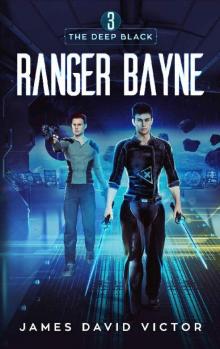 Ranger Bayne
Ranger Bayne Valyien Boxed Set 3
Valyien Boxed Set 3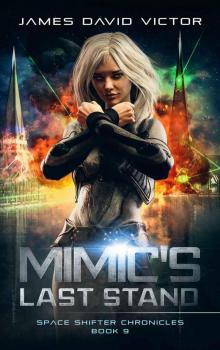 Mimic's Last Stand
Mimic's Last Stand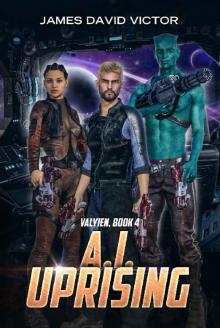 A. I. Uprising (Valyien Book 4)
A. I. Uprising (Valyien Book 4)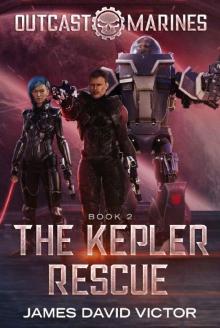 The Kepler Rescue
The Kepler Rescue Last Stand Boxed Set
Last Stand Boxed Set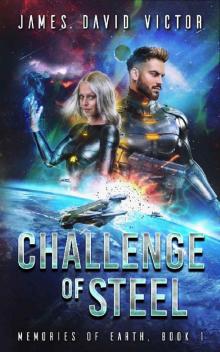 Challenge of Steel
Challenge of Steel Mimic Saves Her People
Mimic Saves Her People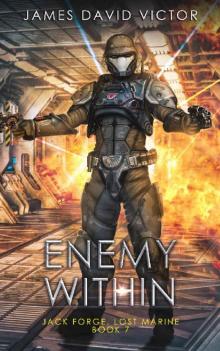 Enemy Within (Jack Forge, Lost Marine Book 7)
Enemy Within (Jack Forge, Lost Marine Book 7)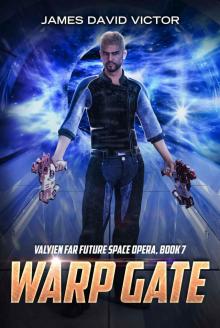 Warp Gate (Valyien Far Future Space Opera Book 7)
Warp Gate (Valyien Far Future Space Opera Book 7)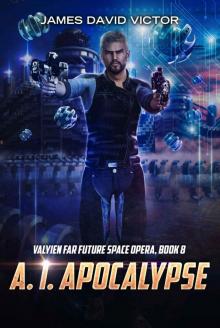 A. I. Apocalypse (Valyien Far Future Space Opera Book 8)
A. I. Apocalypse (Valyien Far Future Space Opera Book 8) Captain Bayne Boxed Set
Captain Bayne Boxed Set Blue Star Marine Boxed Set
Blue Star Marine Boxed Set Night Raiders
Night Raiders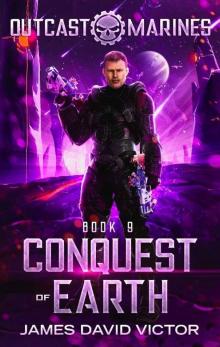 Conquest of Earth
Conquest of Earth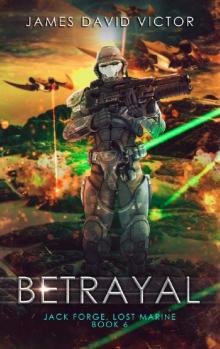 Betrayal (Jack Forge, Lost Marine Book 6)
Betrayal (Jack Forge, Lost Marine Book 6) Sharpe End
Sharpe End Parallax
Parallax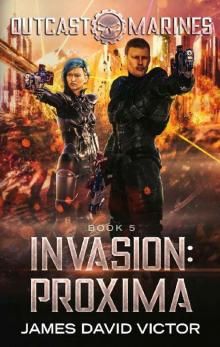 Invasion- Proxima
Invasion- Proxima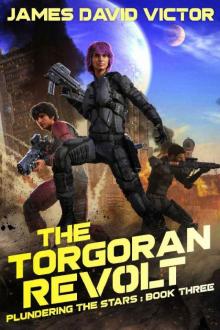 The Torgoran Revolt (Plundering the Stars Book 3)
The Torgoran Revolt (Plundering the Stars Book 3) Outcast Marines series Boxed Set 2
Outcast Marines series Boxed Set 2 Outcast Marines series Boxed Set
Outcast Marines series Boxed Set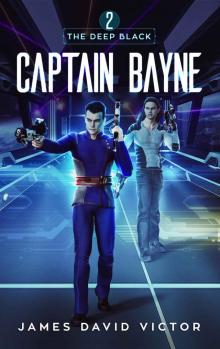 Captain Bayne
Captain Bayne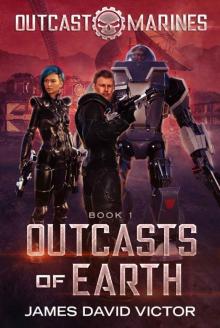 Outcasts of Earth (Outcast Marines Book 1)
Outcasts of Earth (Outcast Marines Book 1)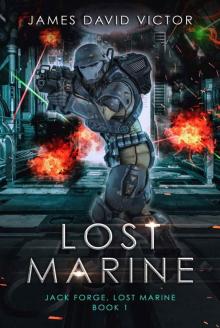 Lost Marine
Lost Marine Eternal Enemy
Eternal Enemy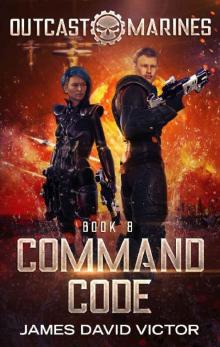 Command Code
Command Code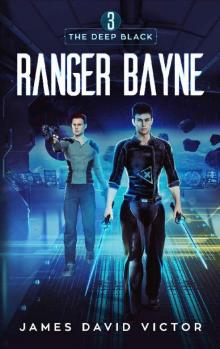 Ranger Bayne (The Deep Black Book 3)
Ranger Bayne (The Deep Black Book 3) Mimic: The Space Shifter Chronicles Boxed Set (Books 1 - 9)
Mimic: The Space Shifter Chronicles Boxed Set (Books 1 - 9) The Deep Black Space Opera Boxed Set
The Deep Black Space Opera Boxed Set Federation at War (Blue Star Marines Book 1)
Federation at War (Blue Star Marines Book 1)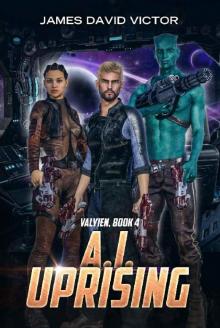 AI Uprising
AI Uprising The Xarren Escape (Plundering the Stars Book 2)
The Xarren Escape (Plundering the Stars Book 2) Valyien Boxed Set 1
Valyien Boxed Set 1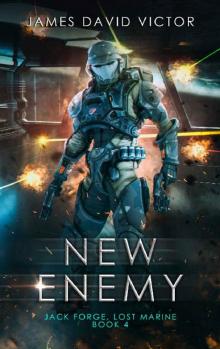 New Enemy (Jack Forge, Lost Marine Book 4)
New Enemy (Jack Forge, Lost Marine Book 4)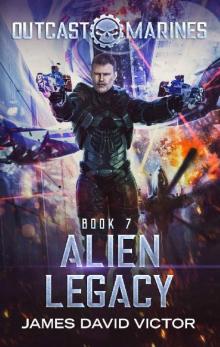 Alien Legacy
Alien Legacy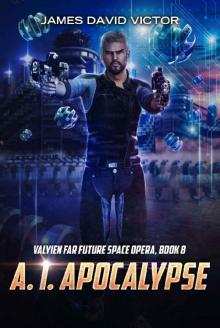 A I Apocalypse
A I Apocalypse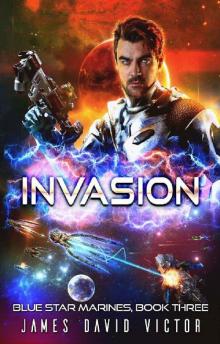 Invasion (Blue Star Marines Book 3)
Invasion (Blue Star Marines Book 3)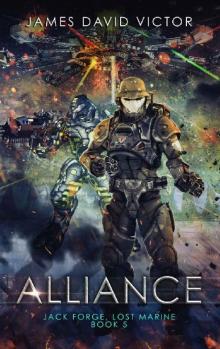 Alliance (Jack Forge, Lost Marine Book 5)
Alliance (Jack Forge, Lost Marine Book 5) Double Sharpe (Raven Sharpe Chronicles Book 2)
Double Sharpe (Raven Sharpe Chronicles Book 2)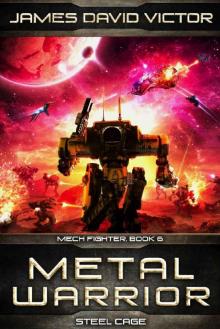 Metal Warrior: Steel Cage (Mech Fighter Book 6)
Metal Warrior: Steel Cage (Mech Fighter Book 6) Parallax (The Deep Black Book 1)
Parallax (The Deep Black Book 1)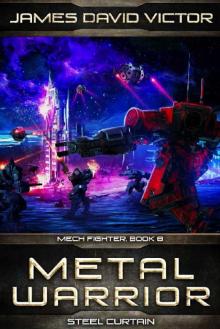 Metal Warrior: Steel Curtain (Mech Fighter Book 8)
Metal Warrior: Steel Curtain (Mech Fighter Book 8)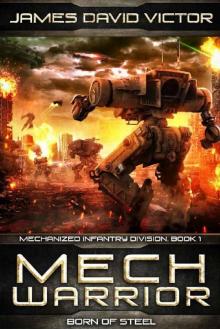 Mech Warrior: Born of Steel (Mechanized Infantry Division Book 1)
Mech Warrior: Born of Steel (Mechanized Infantry Division Book 1) Outcast Marines Boxed Set
Outcast Marines Boxed Set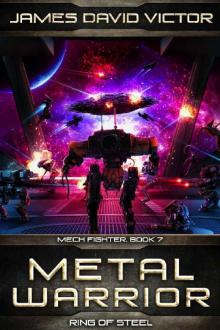 Metal Warrior: Ring of Steel (Mech Fighter Book 7)
Metal Warrior: Ring of Steel (Mech Fighter Book 7) The Elarri Heist (Plundering the Stars Book 1)
The Elarri Heist (Plundering the Stars Book 1)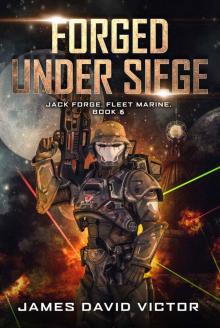 Forged Under Siege (Jack Forge, Fleet Marine Book 6)
Forged Under Siege (Jack Forge, Fleet Marine Book 6)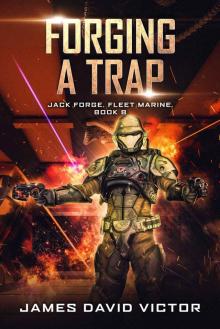 Forging a Trap (Jack Forge, Fleet Marine Book 8)
Forging a Trap (Jack Forge, Fleet Marine Book 8) Daikon (ESS Space Marines Book 2)
Daikon (ESS Space Marines Book 2)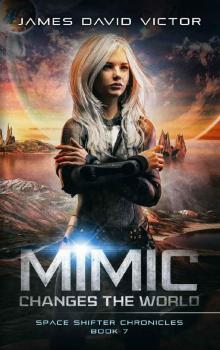 Mimic Changes the World
Mimic Changes the World Double Sharpe
Double Sharpe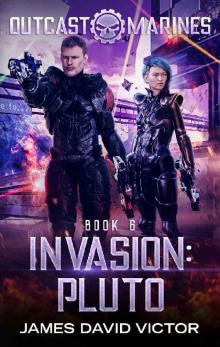 Invasion- Pluto
Invasion- Pluto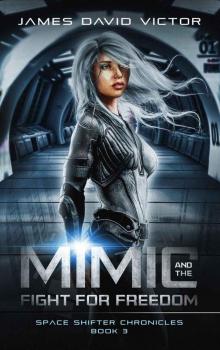 Mimic and the Fight for Freedom (Space Shifter Chronicles Book 3)
Mimic and the Fight for Freedom (Space Shifter Chronicles Book 3)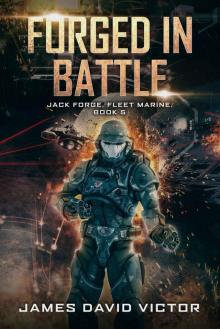 Forged in Battle (Jack Forge, Fleet Marine Book 5)
Forged in Battle (Jack Forge, Fleet Marine Book 5) Lykos (ESS Space Marines Book 6)
Lykos (ESS Space Marines Book 6)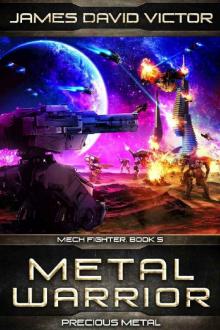 Metal Warrior: Precious Metal (Mech Fighter Book 5)
Metal Warrior: Precious Metal (Mech Fighter Book 5)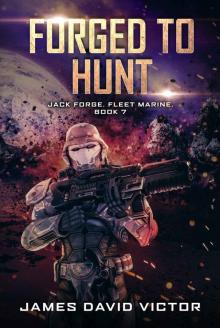 Forged to Hunt
Forged to Hunt Earth Space Service Space Marines Boxed Set
Earth Space Service Space Marines Boxed Set Alpha Rises
Alpha Rises Power of the Seers (Dragon Oracle Book 4)
Power of the Seers (Dragon Oracle Book 4)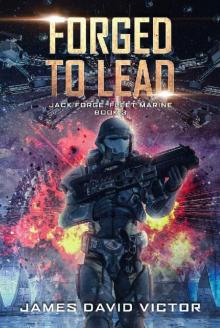 Forged to Lead (Jack Forge, Fleet Marine Book 3)
Forged to Lead (Jack Forge, Fleet Marine Book 3)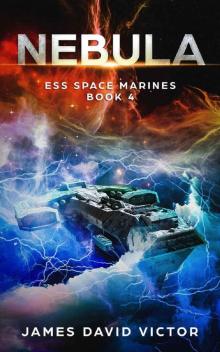 Nebula (ESS Space Marines Book 4)
Nebula (ESS Space Marines Book 4)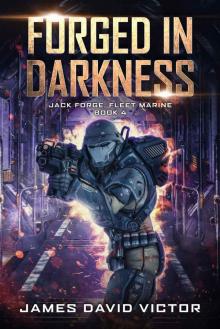 Forged in Darkness
Forged in Darkness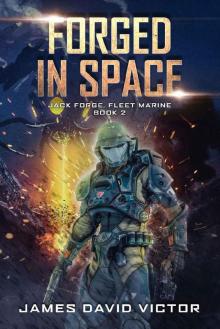 Forged in Space
Forged in Space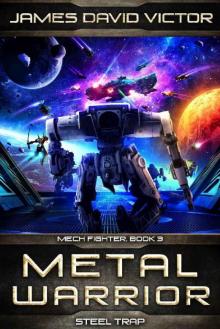 Metal Warrior: Steel Trap (Mech Fighter Book 3)
Metal Warrior: Steel Trap (Mech Fighter Book 3) Mimic and the Space Engineer Boxed Set, Books 1 - 3
Mimic and the Space Engineer Boxed Set, Books 1 - 3 World Breaker Boxed Set (ESS Space Marines Omnibus Book 3)
World Breaker Boxed Set (ESS Space Marines Omnibus Book 3)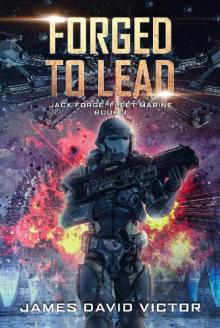 Forged to Lead
Forged to Lead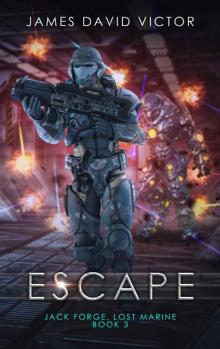 Escape (Jack Forge, Lost Marine Book 3)
Escape (Jack Forge, Lost Marine Book 3)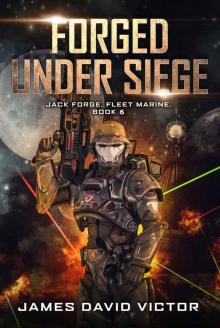 Forged Under Siege
Forged Under Siege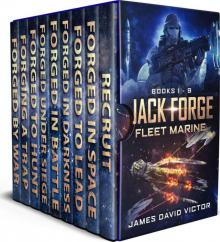 Jack Forge, Fleet Marine Boxed Set (Books 1 - 9)
Jack Forge, Fleet Marine Boxed Set (Books 1 - 9)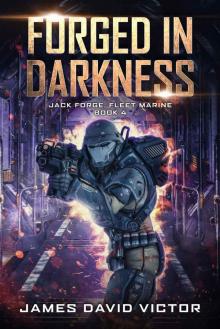 Forged in Darkness (Jack Forge, Fleet Marine Book 4)
Forged in Darkness (Jack Forge, Fleet Marine Book 4) Insurrection
Insurrection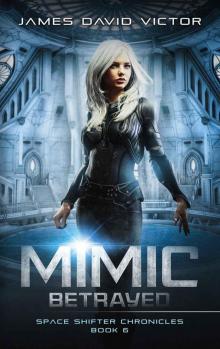 Mimic Betrayed (Space Shifter Chronicles Book 6)
Mimic Betrayed (Space Shifter Chronicles Book 6) Mimic Goes to War (Space Shifter Chronicles Book 5)
Mimic Goes to War (Space Shifter Chronicles Book 5)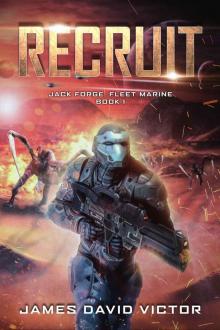 Recruit (Jack Forge, Fleet Marine Book 1)
Recruit (Jack Forge, Fleet Marine Book 1)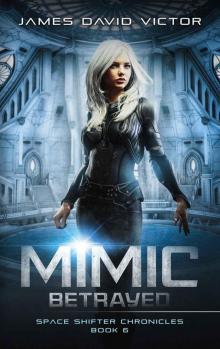 Mimic Betrayed
Mimic Betrayed Power of the Seers
Power of the Seers Mimic and the Journey Home (Space Shifter Chronicles Book 2)
Mimic and the Journey Home (Space Shifter Chronicles Book 2)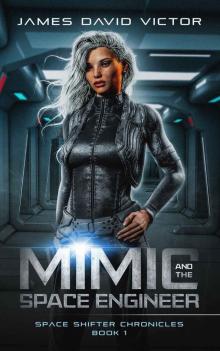 Mimic and the Space Engineer (Space Shifter Chronicles Book 1)
Mimic and the Space Engineer (Space Shifter Chronicles Book 1)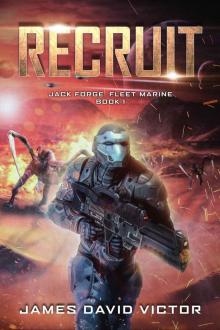 Recruit
Recruit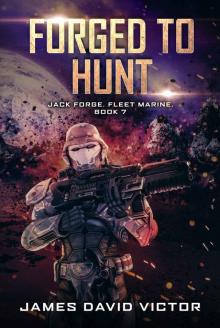 Forged to Hunt (Jack Forge, Fleet Marine Book 7)
Forged to Hunt (Jack Forge, Fleet Marine Book 7)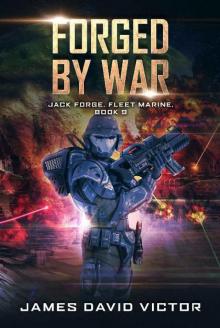 Forged by War (Jack Forge, Fleet Marine Book 9)
Forged by War (Jack Forge, Fleet Marine Book 9)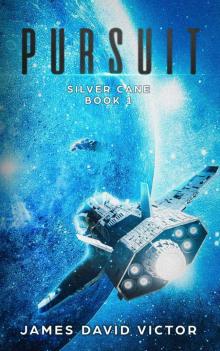 Pursuit (Silver Cane Book 1)
Pursuit (Silver Cane Book 1) Zenith (ESS Space Marines Book 1)
Zenith (ESS Space Marines Book 1) Star Chaser (ESS Space Marines Book 3)
Star Chaser (ESS Space Marines Book 3)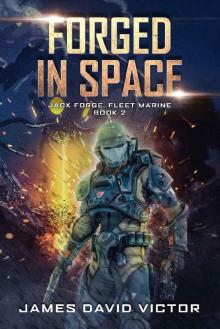 Forged in Space (Jack Forge, Fleet Marine Book 2)
Forged in Space (Jack Forge, Fleet Marine Book 2)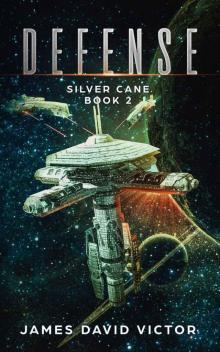 Defense (Silver Cane Book 2)
Defense (Silver Cane Book 2) Infiltrate (Silver Cane Chronicles Book 3)
Infiltrate (Silver Cane Chronicles Book 3) Alpha Rises (Valyien Book 2)
Alpha Rises (Valyien Book 2)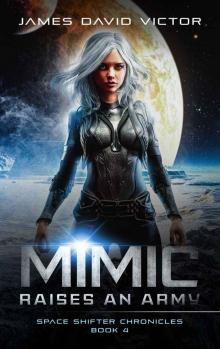 Mimic Raises an Army
Mimic Raises an Army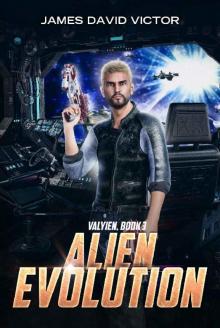 Alien Evolution (Valyien Book 3)
Alien Evolution (Valyien Book 3) Arkana (ESS Space Marines Book 4)
Arkana (ESS Space Marines Book 4) Lykos
Lykos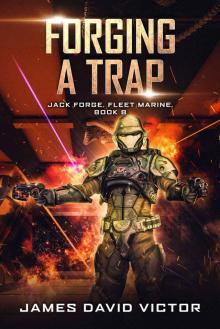 Forging a Trap
Forging a Trap Mimic Goes to War
Mimic Goes to War Earth Space Service Boxed Set: Books 1 - 3 (ESS Space Marines Omnibus)
Earth Space Service Boxed Set: Books 1 - 3 (ESS Space Marines Omnibus) Stranded (ESS Space Marines Book 7)
Stranded (ESS Space Marines Book 7)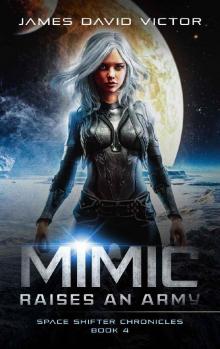 Mimic Raises an Army (Space Shifter Chronicles Book 4)
Mimic Raises an Army (Space Shifter Chronicles Book 4)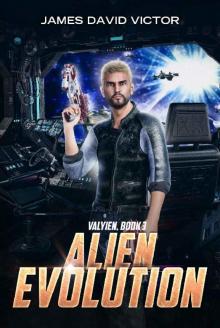 Alien Evolution
Alien Evolution